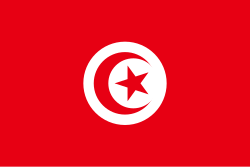Draft:Tunisia
The Republic of Tunisia is a country in north Africa located between Algeria and Libya. Once the location of the great city of Carthage, in the years since it has been gobbled up by various empires. Today, it is most notable for being the only Arab state to be a democracy, being the only success out of the Arab Spring. Although some wonder how long the democracy can last due to issues such as income inequality and terrorism still being a problem in some areas (especially on the border with Algeria), women's rights and freedom of religion are still considerably better in Tunisia than in neighboring countries, and it provides hope that its neighbors could also potentially improve.
History[edit]
Ancient History[edit]
The region we now know as Tunisia was probably first inhabited 200,000 years ago during the Middle Stone Age, as tools dating from then were found in Kelibia![]() . The Capsian culture
. The Capsian culture![]() inhabited the area between 10,000 and 6000 BCE. By 3000 BCE, a Neolithic culture that had developed agriculture had arisen. The ancient Berbers were farmers, herders, and pottery-makers. Around this time, Egyptian writing provided the first written record of Berbers (albeit ones from modern-day Libya).
inhabited the area between 10,000 and 6000 BCE. By 3000 BCE, a Neolithic culture that had developed agriculture had arisen. The ancient Berbers were farmers, herders, and pottery-makers. Around this time, Egyptian writing provided the first written record of Berbers (albeit ones from modern-day Libya).
Carthage[edit]
Carthage was a city founded by Phoenicians somewhere around 800 BCE. It was one of the most successful colonies, so it became the hegemon of Phoenician cities in the west after the motherland itself declined. Unfortunately, we know surprisingly little about the development of a formidable power, because most Carthaginian documents were destroyed by the Romans, and our main accounts by outsiders are...the very Romans who destroyed them, so these can't be taken at face value. The Greeks also wrote a fair bit about them but considering they struggled over control of the western Mediterranean, they also have an interest in painting the Carthingians in very Dark colors. For instance, the popular image of various Phoenician gods (like Baʿal Ḥammon or Moloch) as nightmarish devourers of children owes a lot to these accounts, and popular memory of them.

